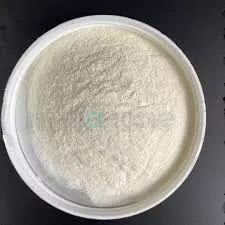
Dec . 12, 2024 09:16 Back to list
hydroxypropyl methyl cellulose in supplements
The Role of Hydroxypropyl Methylcellulose in Supplements
In the vast landscape of dietary supplements, various ingredients are employed to enhance formulation stability, bioavailability, and overall effectiveness. One such ingredient that has garnered attention is Hydroxypropyl Methylcellulose (HPMC). This versatile polymer, derived from cellulose, plays a crucial role in the supplement industry, often serving as an excipient or thickening agent. Understanding the properties and benefits of HPMC can shed light on its increasing prevalence in supplements.
What is Hydroxypropyl Methylcellulose?
Hydroxypropyl Methylcellulose is a semi-synthetic polymer that is soluble in cold water, making it a preferred choice for various applications, particularly within pharmaceuticals and food products. Its structure allows it to form a gel-like consistency when hydrated, which aids in the controlled release of active ingredients. HPMC exhibits rheological properties that can modify the viscosity of formulations, which is particularly beneficial for liquid supplements.
Benefits of Hydroxypropyl Methylcellulose in Supplements
1. Binding Agent HPMC acts as an effective binding agent in tablet formulations, ensuring that the ingredients are uniformly mixed and compressed. Its ability to hold formulations together makes it essential in the manufacturing of reliable and consistent dietary supplements.
2. Stabilizer The stability of active ingredients within supplements is paramount. HPMC helps stabilize sensitive compounds by providing a protective medium, thereby prolonging shelf life and ensuring that the product maintains its integrity over time.
3. Controlled Release One of the significant advantages of HPMC is its role in controlled-release formulations. By adjusting the concentration of HPMC within a supplement, manufacturers can modulate the release rate of the active ingredients, ensuring a prolonged therapeutic effect. This characteristic is particularly beneficial in supplements targeting chronic health issues, where sustained nutrient release can lead to improved efficacy.
hydroxypropyl methyl cellulose in supplements

4. Thickening Agent Many liquid supplements utilize HPMC as a thickening agent. Its gelling properties enhance mouthfeel and viscosity, improving palatability. This is especially beneficial in the case of nutritional shakes and smoothies, where texture is key to consumer acceptance.
5. Vegetarian and Vegan-Friendly As HPMC is derived from plant cellulose, it is suitable for vegetarian and vegan diets. This aspect has made it an attractive option for supplement manufacturers aiming to cater to a broader audience, particularly in a market increasingly leaning towards plant-based products.
6. Hypoallergenic Nature HPMC is known for its hypoallergenic properties, making it a safe option for individuals with sensitivities or allergies. It is free from major allergens, which is crucial for developing supplements that cater to individuals with specific dietary restrictions.
Applications in Various Types of Supplements
The applications of Hydroxypropyl Methylcellulose are vast and can be found in numerous types of supplements, including
- Multivitamins HPMC is often used to bind tablets and enhance stability. - Protein Powders In protein supplements, HPMC can improve texture and solubility, leading to a better mixing experience. - Herbal Supplements HPMC assists in the formulation of herbal extracts by stabilizing the active constituents and enhancing their bioavailability.
Conclusion
Hydroxypropyl Methylcellulose is a multifaceted ingredient that plays a pivotal role in supplement formulation. Its attributes as a binding agent, stabilizer, and thickening agent make it indispensable in the manufacturing of various dietary products. As the supplement industry continues to evolve, the demand for innovative, effective, and user-friendly formulations is on the rise, and HPMC fits seamlessly into this narrative. With its plant-based origin and favorable properties, it stands as a testament to the intersection of functional science and consumer health in the ever-expanding world of dietary supplements.
-
Versatile Hpmc Uses in Different Industries
NewsJun.19,2025
-
Redispersible Powder's Role in Enhancing Durability of Construction Products
NewsJun.19,2025
-
Hydroxyethyl Cellulose Applications Driving Green Industrial Processes
NewsJun.19,2025
-
Exploring Different Redispersible Polymer Powder
NewsJun.19,2025
-
Choosing the Right Mortar Bonding Agent
NewsJun.19,2025
-
Applications and Significance of China Hpmc in Modern Industries
NewsJun.19,2025







